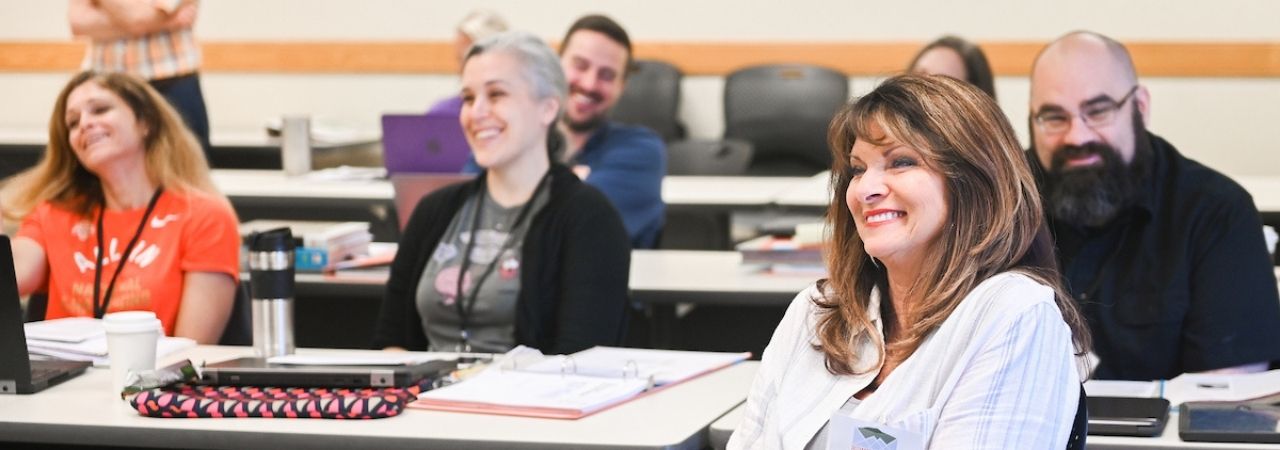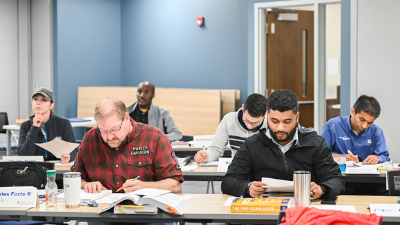 Many students are working professionals who have incredible demands outside the classroom. The luxury of only focusing on coursework is a pipe dream. With so many competing priorities, what makes students successful? While there are various strategies you can implement into your experience, you can also mold your study and work habits to fit with characteristics that make a student successful. Check out our top seven attributes that we believe will help you in the classroom and in the workforce.
Many students are working professionals who have incredible demands outside the classroom. The luxury of only focusing on coursework is a pipe dream. With so many competing priorities, what makes students successful? While there are various strategies you can implement into your experience, you can also mold your study and work habits to fit with characteristics that make a student successful. Check out our top seven attributes that we believe will help you in the classroom and in the workforce.
RESPONSIBLE
ABOUT THE ATTRIBUTE: Successful students are responsible. They are proactive in making sure all their assignments and tasks are completed by their due date. They don’t have to be constantly reminded to finish their coursework because they have planned, in advance, to make sure things get done. Not only are they responsible for tangible tasks like projects, but they are also responsible for their learning process. They talk to their instructor when they need help, use self-discipline to stay focused during lectures, make sure they bring everything they need to class, etc.
APPLICATION: Be responsible by making sure that you stay informed and remember what an instructor tells you. For example, if you’re in UTC’s Clinical Medical Assistant Academy, and your instructor tells you to wear scrubs to class, make a note of that in your calendar or phone so you don’t forget. If you need certain materials or technology to participate in the course, make sure that you get them beforehand. Proactively figure out solutions to any questions or problems that may arise. Life throws us curveballs, but taking responsibility and handling the curveballs appropriately is important.
Being responsible is also implementing self-discipline to get your tasks done. For instance, eliminate distractions like social media by putting your cell phone on silent or temporarily deleting apps before you work. Another way to be more responsible is to stay organized. (Many traits go hand-in-hand with one another). Planners and to-do lists will help you go far!

SELF-MOTIVATED
ABOUT THE ATTRIBUTE: Successful students are self-motivated. While instructors motivate students through encouragement, successful students also set personal goals and motivate themselves to get things done. They are committed to reaching their goals and are ready to tackle the work that lies ahead to meet them. They have a growth mindset, believing they can accomplish even the hardest of tasks with a strong work ethic and perseverance.
APPLICATION: In “7 Strategies for Success as a Student,” we mention why understanding your purpose is important. Understanding purpose and knowing one’s ultimate goal (for example, I want to take a medical billing and coding course so I can start a new career and create a better life for my family) often serves as great motivation for students. First, spend time identifying your ultimate goal and purpose. From there, break your overarching goal into smaller, more attainable goals (for example, by dedicating one hour a day toward studying). Once you’ve identified your goals, write them down on notecards or Post-Its and place the notes where you will see them often.
Use incentives to reward yourself after finishing assignments. When you complete small tasks, reward yourself in fun, creative ways, like treating yourself to your favorite snack or candy. Motivate yourself on a bigger scale, such as with a meal at your favorite restaurant, after completing long-term assignments.
RESILIENT
ABOUT THE ATTRIBUTE: Successful students are resilient. They remain persistent, even when the going gets tough. If they don’t make the grade they wanted on an exam or don’t grasp concepts as quickly as they would like, they don’t let themselves get easily frustrated. Instead, they persevere and rely on their strength and confidence to know they will do better next time. They have a tough mentality and know that adversity does not define them or their abilities as a student.
APPLICATION: First, avoid the tendency to panic. Remind yourself that everyone faces challenges in all aspects of life, and you are not the first person to face your current situation. If you are struggling, take time to reflect and think through the struggle. Pinpoint the source of your frustration. Once you have a better understanding, begin to strategize how you can conquer the obstacle and move toward your goals. If you are falling behind or need help, talk to your instructor or another student in the course.

CONCEPTUAL
ABOUT THE ATTRIBUTE: Successful students are conceptual. They think critically about the concepts they are learning and how they are going to apply them. They consider how what they are learning connects to other subjects or aspects of their life. It’s not only about how they think but also how they approach what they are learning. They don’t learn to pass an exam and then forget the information. Instead, they learn with the “bigger picture” in mind and consider how what they are learning will advance their career.
APPLICATION: One of the best ways to make sure you aren’t “learning just to learn” is to ask yourself: “If I am out in the field, how could I apply this concept to better the organization I am at?” Think about the real-world scenario and reflect. Memorization and facts can be important, but take time to really analyze what you are learning. Participate in classroom discussions and think critically about others’ perspectives. Also, listen to questions that others are asking and think about how you would answer.
RESOURCEFUL
ABOUT THE ATTRIBUTE: Successful students are resourceful. They know they must expand their learning outside of class lectures in order to enhance their experience. They interact with their instructor and peers, knowing their insight can be tremendously valuable. They seek out resources and use podcasts, books, subject matter experts, and forums to become well-rounded on topics. Not only do successful students use resources to become more knowledgeable, but they also use tools like study apps to enhance their studying and make studying easier.
APPLICATION: This one is simple: seek out the resources! Ask your instructor questions and exchange dialogue about topics that you find particularly interesting. Listen to your peers’ viewpoints to help you grow, learn, and understand how they see the world. Find books to read by going to your local public library; use Apple Podcasts or Spotify to search for podcasts. Google what you’re learning and find reputable articles to help you dig into the subject. Whatever you do, just don’t be passive; immerse yourself in knowledge. Use study apps as a resource to make studying easier (and even more enjoyable).

ORGANIZED
ABOUT THE ATTRIBUTE: Successful students are organized. In order to be responsible and keep track of everything, they know that they can’t have printed papers thrown in their backpack at random, scribbled to-do lists on napkins, and notes written in ten different notebooks. They take time to plan and find ways to keep track of assignments, projects, etc. They know what tasks are coming up and schedule out time for long-term assignments in advance so they aren’t scrambling to get things done last minute.
APPLICATION: Whether you use a physical planner, an app like MyStudyLife, or the calendar on your phone, use a planner and schedule out assignments to stay organized. After you get your syllabus, take the time to create a long-term schedule and write it (or type it) in your planner. Organize not only your time but also your materials and space. If you have physical school supplies you use, papers you print, or books you read, keep all your things in your backpack. Clean it out once a week so you can easily reference what you need. We also recommend keeping your notes in one central place, like in a Google Doc or in a notebook. And, studying in an organized space without clutter enables you to focus more easily.
INTERACTIVE
ABOUT THE ATTRIBUTE: Successful students are interactive. They don’t stay in a reclusive bubble; they communicate. They share thoughts on what they are learning and answer questions the instructor asks. Also, interactive students are not afraid to ask the instructor for help if they are struggling with what they are learning.
APPLICATION: This one is simple, as well. If you have questions or even just want to ask your instructor for further input on a subject, ASK! Collaborate with and talk to other students. Form study and support groups, if needed. That can even be done virtually if you’re studying in different places!

Now it’s time for you to put these attributes into practice. Doing so will enhance your educational experience so you can live life a little easier, be less stressed—and ultimately, be the best student you can be.